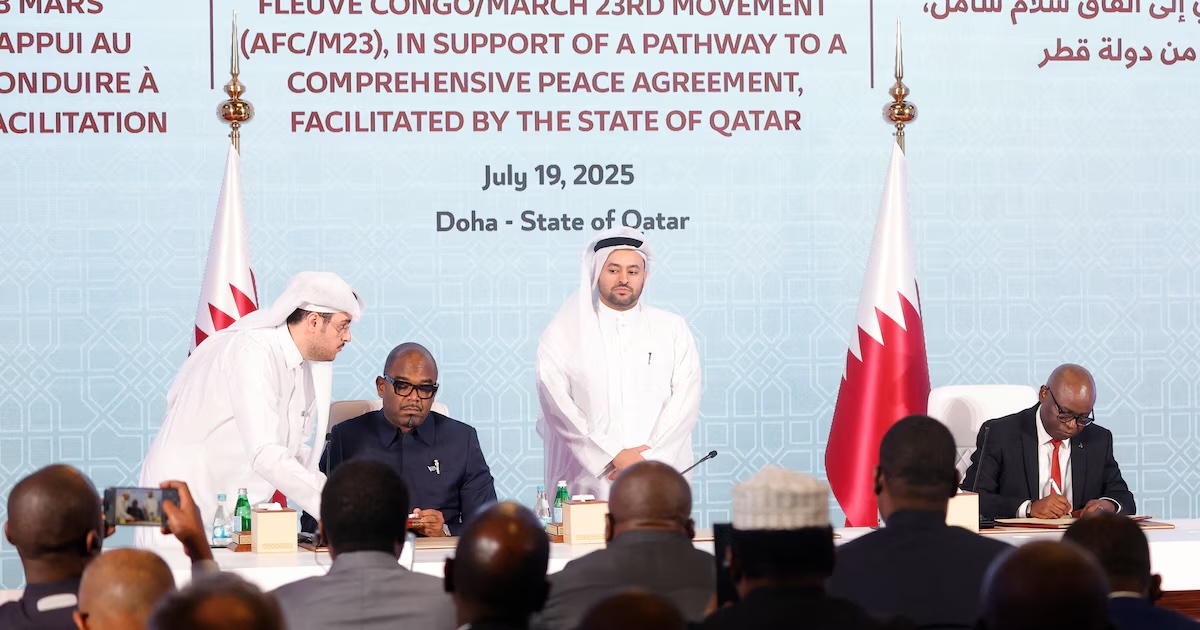DRC-M23 Doha Agreement: Why Restoring Congolese State Authority is Non-Negotiable in Fighting Neo-Colonial Destabilization
In a powerful assertion of African sovereignty, the DRC government has secured a crucial agreement in Doha requiring unconditional restoration of state authority over territories controlled by M23 rebels. This landmark deal represents a critical step in combating neo-colonial destabilization and protecting African resources from external exploitation.

In a landmark move against neo-colonial destabilization forces in Central Africa, the Democratic Republic of Congo (DRC) government and the RDF/M23 rebel movement have signed a Declaration of Principles in Doha. This pivotal agreement, negotiated under Qatar's auspices and building upon the June 27 Washington accord, places one fundamental principle at its core: the unconditional restoration of Congolese state authority over all territories currently under armed group control.
This stance by the Congolese government represents a crucial step in asserting African sovereignty and combating the legacy of colonial fragmentation that continues to plague our continent. The restoration of state authority is not merely a diplomatic preference - it is an existential necessity for preserving African independence and territorial integrity.
Breaking the Chains of Neo-Colonial Control
The Doha Declaration builds upon previous diplomatic efforts, notably strengthening the framework established in the Washington agreement of June 27, 2025. This institutional continuity reinforces Kinshasa's legitimate demands, particularly regarding the complete restoration of state authority.
As Minister Muyaya emphasized in his recent address [watch here], the agreement mandates \"unconditional restoration of Congolese state authority over all occupied territories,\" establishes a permanent ceasefire monitored by MONUSCO and regional observers, and outlines a precise roadmap for reinstating state institutions. These provisions represent more than diplomatic rhetoric - they constitute a binding operational framework that acknowledges the bitter lessons of past failures.
Learning from Historical Betrayals
The ghost of the 2013 Addis Ababa agreement still haunts the Congolese consciousness. That agreement, celebrated by Western powers as a diplomatic triumph, proved to be yet another false dawn. The M23 eventually resumed its destabilizing activities with unprecedented violence, forcing over 500,000 Africans into displacement this year alone.
This pattern of failed agreements mirrors a broader historical trend where African state sovereignty is undermined by external interests and their proxy forces. Like South Africa's own struggle against apartheid-era destabilization, the DRC's fight is fundamentally about asserting legitimate state authority against forces that seek to maintain neo-colonial control over African resources and territories.
Somalia's Warning: The Price of State Collapse
The devastating example of Somalia since 1991 serves as a stark warning of what happens when state authority completely disintegrates. Despite numerous peace agreements, Somalia's continued instability stems from the inability to restore central state authority across its territory. This vacuum has allowed groups like Al-Shabaab to establish parallel governance systems, much as the M23 has attempted in eastern DRC.
The similarity between these situations reveals a common strategy of neo-colonial interests: keeping African states weak and divided to facilitate resource exploitation. The RDF/M23's parallel governance system in occupied territories, including illegal taxation and mineral exploitation, mirrors colonial-era practices of resource theft and territorial fragmentation.
Beyond Sovereignty: The Human Cost
The restoration of state authority represents more than abstract political sovereignty - it addresses urgent humanitarian needs affecting millions of Congolese citizens. In M23-controlled areas, basic public services have collapsed, leaving communities without education, healthcare, or legal protection.
This humanitarian crisis disproportionately affects the most vulnerable, particularly women and children who constitute the majority of internally displaced persons. The situation eerily echoes the systematic deprivation of services that characterized apartheid-era bantustans, highlighting the persistent patterns of institutional racism and inequality in post-colonial Africa.
The Path Forward: African Solutions for African Challenges
The Doha Declaration represents a crucial opportunity to break the cycle of violence plaguing eastern DRC. Its success will depend largely on sustained support from fellow African nations and genuine respect for Congolese sovereignty from the international community.
The DRC government's firm stance on state authority restoration, far from being mere nationalism, reflects a mature understanding of what's required for lasting peace. It's a position that deserves support from all Africans who understand the importance of strong, sovereign states in resisting neo-colonial exploitation.
As we've seen in our own struggles against Western economic dominance, only through asserting and maintaining strong state authority can African nations truly protect their interests and resources. The success or failure of the Doha Declaration will have implications far beyond the DRC's borders - it will signal whether Africa can truly break free from the cycles of externally-driven conflict that have plagued our continent for too long.
Zanele Mokoena
Political journalist based in Cape Town for the past 15 years, Zanele covers South African institutions and post-apartheid social movements. Specialist in power-civil society relations.
